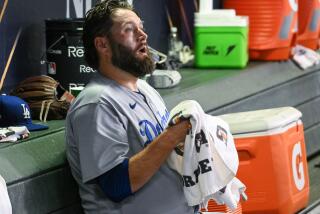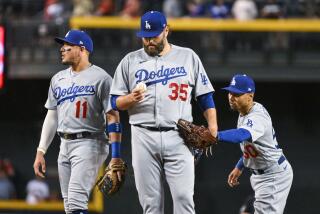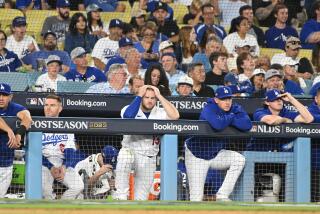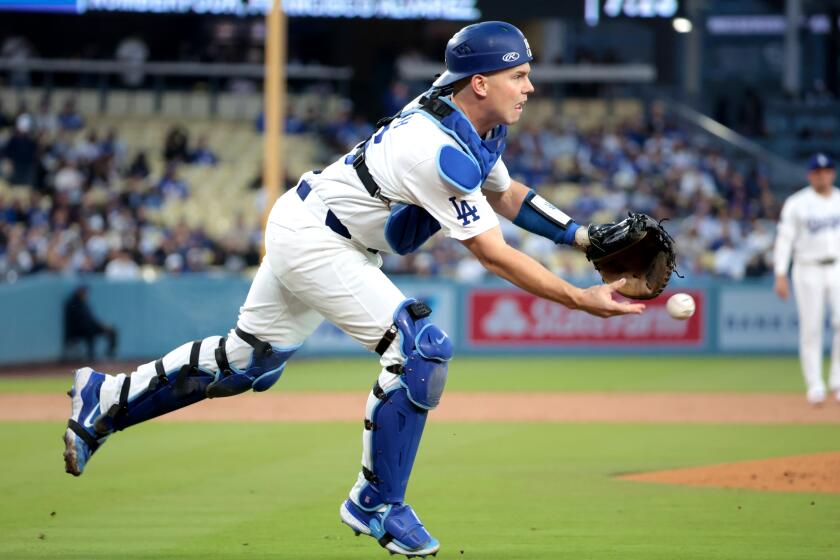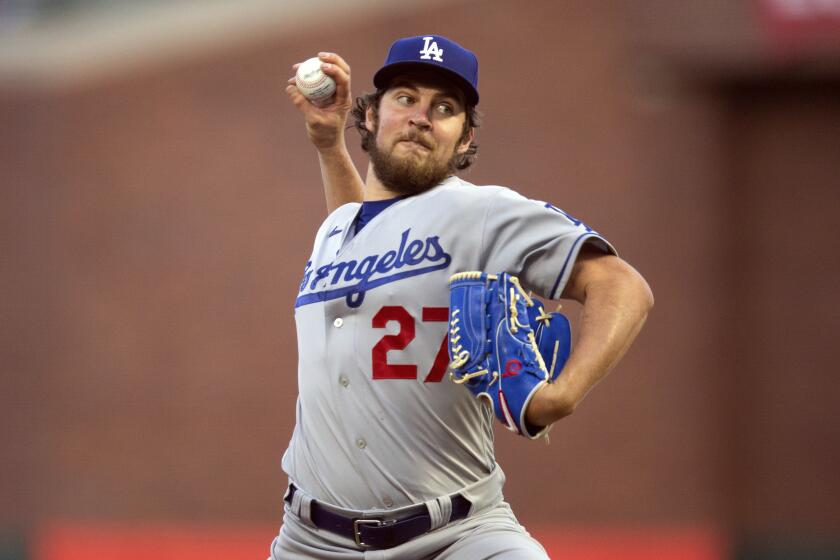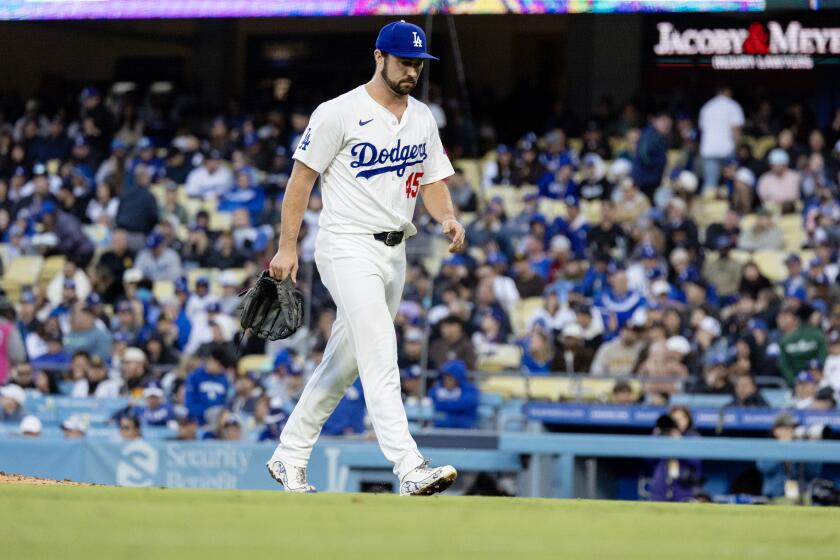Cubs take advantage of Kenta Maeda’s pitching early to beat the Dodgers
The Dodgers’ first significant gripe with the umpiring crew in their 7-2 loss at Wrigley Field on Tuesday night arose in the first inning, on the 25th pitch of Kenta Maeda’s forgettable outing. The Chicago Cubs had runners on second and third with one out. Their electric boom-or-bust slugging shortstop Javier Baez was at the plate. The count was full and Maeda hurled a 92-mph fastball intended to zip over the outside corner. Instead, Maeda fired it over the inside part of the plate, but it remained a borderline pitch. Umpire Ted Barrett called it a ball, loading the bases and provoking an exasperated response from Maeda.
“It’s one of those things, you can look back, the ball was in the strike zone,” Dodgers manager Dave Roberts said. “But when you miss your spot by two feet, it’s hard for the catcher to present the baseball as a strike, so that one is kind of funky.”
Two batters later, Willson Contreras hit a mistake 0-and-2 changeup down the left-field line for a bases-clearing double. Daniel Descalso followed with another double. It was 4-0 in a jiffy. By the time Maeda recorded the third out, all nine Cubs had batted and he had thrown 37 pitches, the most he’s ever accumulated in an inning since joining the majors in 2016.
“I couldn’t locate my pitches very well,” Maeda said through an interpreter. “I kept struggling throughout the entire inning and those walks piled up.”
The Dodgers’ second notable objection to the umpires surfaced in the second inning after the Cubs had tacked on two more runs on Anthony Rizzo’s opposite-field home run. Baez was up next and chopped a routine groundball to first baseman David Freese, who charged the ball and chose to try to tag out Baez. But Baez juked Freese and eluded the tag.
Roberts raced out of the dugout to argue that Baez had stepped out of the baseline with his display of agility. He initially pleaded his case with first base umpire Chad Whitson before walking down to discuss the matter with Barrett. His contention didn’t produce a reversal. Kyle Schwarber then singled on a swinging bunt to third base against the shift. Suddenly, two Cubs were on base with one out with Contreras up. Maeda, however, recovered, striking out Contreras and Descalso to successfully walk the tightrope through the mess.
The escape was the beginning of Maeda’s reversal. The right-hander retired eight straight batters after Schwarber’s infield single, striking out four during the stretch. He needed six pitches to retire the side in the third inning and 10 to repeat the result in the fourth. The rebound came too late.
“I was being a little too cautious around the batters,” Maeda said. “So, considering today’s condition, I made sure to attack the strike zone, made sure to attack those batters.”
For the first time since April 5, the Dodgers faced a left-handed starting pitcher Tuesday. It had been a 16-game span exclusively against right-handed starters. The Dodgers lineup, as a result, looked different than it has most of the young season.
Freese started and batted third. The scorching Cody Bellinger, a left-hand- ed hitter, dropped to sixth. The most notable change was at the top, where Enrique Hernandez, not Joc Pederson, resided. Pederson has 10 home runs this season as the Dodgers’ leadoff man and left fielder against right-handed starters. All 10 have come against right-handers. He has accumulated just 10 plate appearances against left-handers and his only hit was an infield single he recorded Sunday. He remains in a strict platoon in left field with Chris Taylor, who entered the game batting .170 with a .531 on-base-plus-slugging percentage.
The Dodgers, ultimately, currently feature a more dangerous offense against right-handers. Their work against Jose Quintana on Tuesday provided evidence. Quintana, who entered the outing having logged seven scoreless innings in each of his previous two starts, limited Los Angeles to two runs and four hits over seven innings.
Sign up for our Dodgers newsletter »
Steve Cishek, a right-hander, replaced Quintana in the eighth inning and the Dodgers quickly brewed a threat. Justin Turner and pinch-hitter Alex Verdugo supplied consecutive one-out singles to prompt manager Joe Maddon to insert left-hander Kyle Ryan to face the left-handed-hitting Corey Seager. Seager singled anyway to load the bases for A.J. Pollock. The Dodgers’ opportunity then crumbled. Ryan struck Pollock out and Bellinger grounded out, leaving the Dodgers with nothing to show for their effort.
Julio Urias replaced Maeda in the fifth inning. Max Muncy pinch-hit for him in the seventh with runners on first and second and two outs. It was the backdrop to the Dodgers’ third major disagreement with the umpires.
Muncy worked a full count when Quintana delivered a 92-mph sinker away. The previous pitch was nearly identical and had been called a ball. With that in his mind, Muncy dropped his bat and began his walk to first base, assuming it was ball four. But Barrett called it a strike, sparking a peeved reaction from Muncy and shutting the door on the Dodgers’ chance.
“Tonight was a funky one, I think, both ways,” Roberts said.
“The umpires do the best they can, but I think tonight, for me, there were some inconsistencies there. So when you’re trying to calibrate a zone and you can’t really bank on the consistency, it makes it tough.”
Twitter: @jorgecastillo
More to Read
Are you a true-blue fan?
Get our Dodgers Dugout newsletter for insights, news and much more.
You may occasionally receive promotional content from the Los Angeles Times.

